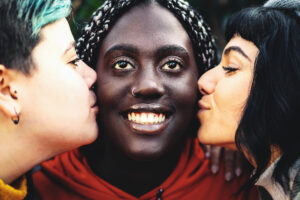In today’s evolving conversation around gender identity, the term “agender” has become increasingly recognized and embraced. But what exactly does agender mean, and how does it fit into the larger spectrum of gender diversity? In this article, we’ll dive into the concept of being agender, the significance of the identity, and how to respectfully engage with individuals.

What Is Agender?
The term “agender” refers to a person who does not identify with any gender. While many people align with a specific gender, such as male or female, agender individuals may experience a sense of being gender-neutral, or they may feel an absence of gender altogether. For some, the experience is that of living without the internal sense of gender that most others identify with.
People can also be referred to as being gender-free, genderless, or gender-neutral.
Agender and Gender Identity
This name falls under the non-binary umbrella. Non-binary refers to any gender identity that doesn’t fit exclusively into the categories of male or female. This is unique in that it represents a lack of gender, rather than a combination or variation of traditional gender roles.
Key Aspects of Agender Identity:
- Lack of Gender Association: Individuals often feel a disconnection from the concept of gender altogether.
- Gender Neutrality: Some agender people prefer to be viewed as neutral in terms of gender.
- Varied Expression: Agender individuals may express themselves in ways that are traditionally masculine, feminine, or a blend of both, but these expressions are not necessarily linked to their gender identity.
Pronouns for Agender People
When it comes to addressing agender individuals, pronouns are an important aspect to consider. Many agender people use gender-neutral pronouns like “they/them,” but some may prefer other pronouns or none at all. Always ask and use the pronouns that someone specifies to show respect for their identity.
Common pronouns used by agender individuals include:
- They/Them/Theirs
- Ze/Zir/Zirs
- Xe/Xem/Xyr
Respecting someone’s pronouns is key to supporting their identity and making them feel seen and valued.
Agender vs. Other Non-Binary Identities
It’s important to understand that while agender is part of the non-binary spectrum, it differs from other identities under this umbrella. For example, genderfluid individuals might experience shifts between different gender identities, while bigender people might identify with two distinct genders. Agender people, on the other hand, often describe their experience as an absence of gender or detachment from the concept of gender entirely.
Why Agender Identity Matters
Understanding identity is part of a broader conversation about inclusivity and recognizing the diversity of human experiences. Everyone deserves to have their gender identity respected and validated, including those who do not fit into the traditional binary understanding of male and female. Agender individuals contribute to the rich diversity of the human experience by challenging the notion that everyone must fit into predetermined categories.
How to Support Agender People
If you want to support agender individuals, here are a few key steps to take:
- Use Correct Pronouns: Always ask and respect an individual’s preferred pronouns.
- Avoid Assumptions: Don’t assume someone’s gender based on their appearance or behavior.
- Educate Yourself: Learn about gender diversity and share that knowledge to foster greater understanding in your community.
- Create Inclusive Spaces: Whether in the workplace, at school, or in social settings, ensure that everyone feels welcome regardless of their gender identity.
Conclusion
This is a valid and important gender identity within the broader non-binary community. Recognizing and respecting individuals not only promotes inclusivity but also enriches our understanding of the diverse ways people experience gender. By learning more and advocating for gender-neutral spaces, we can support individuals and contribute to a more inclusive world.